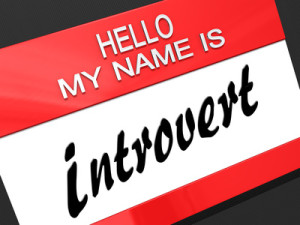 per·son·al·i·ty [pərsəˈnalədē] , n.
per·son·al·i·ty [pərsəˈnalədē] , n.
-
the combination of characteristics or qualities that form an individual’s distinctive character.
Personality is a lot of things. Sometimes it’s positive — the reason you are magnetic. Conversely, it can have unfavorable attributes — a barrier to compatibility. While it’s been said that someone can have too much or not enough, the recipe for an optimal personality is still yet to be agreed upon.
Perhaps this is the reason that ‘personality type’ has become a focus of many psychologists. The most widely known result of said research is the Myers-Briggs Type Indicator, which generates a four-letter formula describing one’s strengths, tendencies, and personality type. The first of four letters in the formula is either an ‘E,’ meaning extrovert, or an ‘I,’ meaning introvert. Despite only representing one quarter of the Myers-Briggs personality type, intro- and extroversion have become buzzwords with which we classify entire personalities.
But intro- and extroversion are not personality types. True, patterns may emerge in the personalities which they commonly accompany, but at their essence they are simply characteristics of a person’s personality. The misunderstanding of intro- and extroversion is problematic, in part because it is incorrect, but also because American society struggles to accept difference without qualifying it. We feel the need to designate one type, intro- or extroversion, as more desirable given what we think we know about each. In an essay for The Atlantic, Jonathan Rauch, wrote about this dilemma saying:
When an extrovert is described as a “people person” it is a compliment. Introverts are described with words like “guarded,” “loner,” “reserved,” “taciturn,” “self-contained,” “private” — narrow, ungenerous words, words that suggest emotional parsimony and smallness of personality.
Intro- and extroversion are not chosen qualities, but pre-determined operating systems by which we are able to function. The focus, then, should not be on ranking one over the other, but intentional desire to learn and understand each.
So, let’s get technical. What is intro- or extroversion, actually? Simply: The way in which a person becomes energized. Artist, Roman Jones, breaks it down further:
Extroverts gather energy from other people. The social butterflies among us, these folks “absorb” social vibes and require stimulating socialization. They often surround themselves with as many friends and people to talk to as possible. Extroverts may become exhausted from doing nothing and relaxing, because in these situations they struggle to summon energy.
 Introverts, on the other hand, generate their energy from within themselves. When situated in social settings, they give their energy away through interactions with others. By virtually the opposite process as extroverts, introverts often become entirely exhausted after social engagements and embrace downtime as a way to recharge.
Introverts, on the other hand, generate their energy from within themselves. When situated in social settings, they give their energy away through interactions with others. By virtually the opposite process as extroverts, introverts often become entirely exhausted after social engagements and embrace downtime as a way to recharge.
If you can think about intro- and extroversion using only their denotations, its possible to rationalize how seemingly incompatible traits can find synergy in both intro- and extroverts. To explain my point, I present to you:
10 Signs You Might be an Outgoing Introvert
-
You aren’t shy. In fact, you’re probably highly self-aware. You may have insecurities, like everyone, but you don’t allow them to cripple your ability to interact. Sophia Dembling, author of “The Introvert’s Way: Living a Quiet Life in a Noisy World” explained:
The best distinction I’ve heard comes from a neuroscientist who studies shyness. He said, “Shyness is a behavior — it’s being fearful in a social situation. Whereas introversion is a motivation. It’s how much you want and need to be in those interactions.
An outgoing introvert more often welcomes social engagement, but still adamantly retains the control over their motivation to interact.
-
People think you are an extrovert. Maybe it’s because you aren’t shy. But it’s hard not to be confident when you are so self-aware. You’re friendly and welcoming. You appear to know a lot of people because you put effort into caring for acquaintances. Still, you feel as though only a handful of people really know you to your core, one that is highly introverted.
-
You schedule time to hangout with yourself. It’s essential to your mental and emotional wellbeing that you regularly take yourself on dates. You have no issue blowing off others for this reason because you know how ‘crazy-ex-girlfriend’ you will go on yourself if this special alone time isn’t prioritized.
-
 Enter, the Coffee Shop Oasis: the perfect representation of non-invasive stimulation in which you can be surrounded by people, yet left completely alone. This is your haven and where you usually take yourself on a date.
Enter, the Coffee Shop Oasis: the perfect representation of non-invasive stimulation in which you can be surrounded by people, yet left completely alone. This is your haven and where you usually take yourself on a date.
-
You’ve heard this one before: “I can’t figure you out.” Outgoing introverts rely on a balance of socialization and time off the grid to remain healthy. A balance can be found by compartmentalizing your personality, keeping the introverted tendencies separate from others. This means that few may know that part of you even exists. Therefore, when you take a much needed sabbatical from social life, those who assume your extroversion get confused. Additionally, when/if ever they catch a glimpse of your deeply introspective side, it will probably throw them off.
-
Warm the party up. Regardless, you rarely shy away from a party. You may even secretly love being the center of attention, as long as it’s on your own terms. But it takes you some time to warm up before you can really start to enjoy a social situation.
-
You generally roll with a wing-person. For this reason, you generally roll with a trusty wing-person by your side. If you just aren’t feeling the vibe, you need a someone you can fall back on. Otherwise you may recluse inward, be hit with a bout of introspection, and begin overanalyzing everything. As fun as it is to question whether the person you just met in a bar exhibits character traits you strive to foster in yourself — it’s better to leave those thoughts to be addressed on your next date with yourself.
-
Your inner monologue narrates your life. You continually play re-play conversations in your head. You fixate on the new and improved abridged version, what you would have said if you’d only had time to reflect and inwardly process. Because of this, you anticipate upcoming conversations and narrate them out in entirety via inner monologue so that you feel prepared when the time comes.
-
Opinions must be founded, but fluid. You seek sincerity in every conversation. Because of this, you feel easily influenced by people who open up to you and divulge authentic feelings. It takes much reflection and grappling before you can really grasp your own opinion situated among those of others. However, outgoing introverts are generally open minded, valuing the fluidity of ideas, because the more you know, the more likely your opinions are to change.
-
It is possible for you to feel lonely. No one loves alone time more than you, but that doesn’t mean you are immune to loneliness. Sometimes you need people, lots of people, for the exact same reason everyone else does. Humans are social creatures.
Sound like you? Or kind of partially like you? Or like someone you know? Please feel free to take this information and simply know it. There will never be an agreed upon recipe for the optimal personality. So embrace yours, its every last glory and grief.
Get Smart, Get Inspired
Whether you are 14, 19, 23 or a parent/mentor Join our mailing list (we only email 1x a week with something inspiring!) here!
What will they find when they Google you?
Would you like to create a positive online presence? Consider writing for us! Apply here!








Leave A Comment